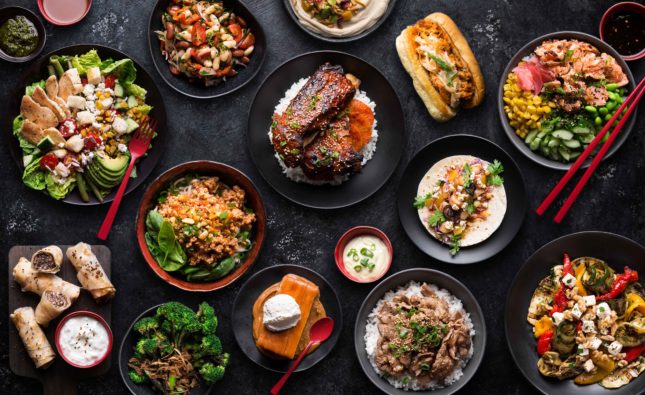When I was much younger, I worked my summers in the kitchens of a lovely country pub in the South West of England. On one lunch shift, a particularly chatty and somewhat needy American couple enjoyed the quintessential English pub experience.
After dozens of requests and questions regarding the menu, the couple finally agreed on a turkey sandwich for her and a ploughman’s lunch for him. As the waitress dropped the food off at their table, the lady inquired about what kind of turkey was in the sandwich.
I don’t think anyone had asked a question like that before, in the whole of the UK, ever.
The waitress lifted the top slice of bread from the sandwich and closely inspected the turkey meat, giving it a good sniff for dramatic effect.
Dropping the bread back down, she announced, “it’s a dead one,” to the shock of the American couple. She chose a different career path after that.
My first thought was, “Why did she want to know what kind of turkey it was?” I had never questioned that sort of thing, and my head chef didn’t waste a moment worrying about his ingredients’ origins or provenance.
However, those were the beginnings of an ethical, sustainable movement that hasn’t slowed down until today. It’s just getting bigger and more complex.
For the past two decades, chefs and restaurateurs have shifted their priorities to place greater value on health, empathy, care, and sustainability.
In the early 2000s, we all jumped on a phrase that hadn’t existed before 1970, Ethical Eating, and with that came provenance and origins of ingredients, farm to table dining, and reduction of carbon footprint. Supporting local farmers became popular, as did filtered tap water and single-use plastic demands and zero waste dinners. Menus used terminology like hormone-free, organic, line-caught and grass-fed.
In 2004, I launched a popular London based franchise here in Dubai. During one of their annual quality audits, I was amazed when they asked for all our supplier information. They spend an afternoon calling the suppliers to verify we had been paying our invoices on time. For them, it was important. Another franchise I worked with had defined sustainability standards, such as keeping the kitchen exhaust off until the hotline was cooking and all taps fitted with water saving nozzles.
Opinions and standards were changing fast, and peoples’ expectations of who they did business with evolved and sharpened, as seen in the #metoo and cancel culture movement. Some of the most prominent players in the food industry, from Mario Batali of Eataly fame to Adam Rapoport, editor of Bon Appetit, were held accountable for their unethical behaviour.
It’s been almost 200 years since Anthelme Brillat Savarin wrote, “Tell me what you eat, and I will tell you what you are,” and this quote may never have been so accurate as it is today.
Every time we spend our money with ethical, sustainable businesses that have a positive impact, it’s like voting for a better world.
More of that needs to happen here in Dubai – more restaurants need to be held accountable for how they behave as a business, and the best way is for customers to ask questions and demand specific standards. Through my work as an F&B consultant and food writer, I see examples and hear stories of where our industry falls far short of basic ethical expectations.
Restaurants not paying their suppliers, for example. It happens all the time. That’s the equivalent of a customer ordering lunch and then not paying. A restaurant owner wouldn’t accept it from a guest, yet many are happy to avoid paying their suppliers. Same with the staff – I get dozens of anecdotal stories in my DMs about staff not being paid their salary for months on end.
There are so many examples – everything from lying on menus about ingredient origins to owners keeping staff tips to help fund their lifestyles, to restaurants not providing visas for staff, or flying in carbon footprint heavy ‘artisanal’ water and refusing to stock local water.
Just after lock down ended, I conducted some barista interviews for a new café that was opening here in Dubai. Candidates turned up for their interviews hungry, sleepless, and desperate. Some hadn’t seen any income for five months, their employer leaving them to figure it all out themselves.
One candidate asked if she could have a croissant from the display, as she “hadn’t eaten in a while.”
One candidate asked if she could have a croissant from the display, as she “hadn’t eaten in a while.”
Even The National newspaper brought to light the tough conditions that food delivery drivers are going through. According to their article, some food delivery drivers only earn around nine dhs per delivery, with no salary or accommodation.
I have a list of establishments and businesses I avoid, out of principle, because of their business practices, and many in the industry know who the main culprits are.
Our choices as consumers can dictate the future. However, a naming and shaming strategy has never been the way to do things in this part of the world.
Instead, we should shine a light on the road ahead and talk about the businesses that are positively impacting our society’s development and the preservation of our environment.
What about an accreditation system where qualified establishments get to promote their “Better Business Badge” – a guarantee of good businesses doing good.
Additionally. along with the industry awards celebrating the best brunch and best restaurant, we also create awards celebrating best in class ethical restaurants and showcase inspiring companies that run their business with integrity and transparency.
How about a guide book that focuses on restaurants who put people above profit, restaurants that give more than they take, restaurants that leave their communities a better place for having been there.
The great thing is, this shift has started across the globe through the James Beard Awards, The 50 best, Truth Love and Clean Cutlery guide book, and many others.
Ethical consumer spending has hit record levels in the UK. Ethical consumers have an acute awareness of sustainability issues and the power to shift the market. Businesses that take responsibility for their impact on the environment, people, and animals will be welcomed and supported by their communities. In time, those that don’t will be forgotten, by staff, by customers and by suppliers.










